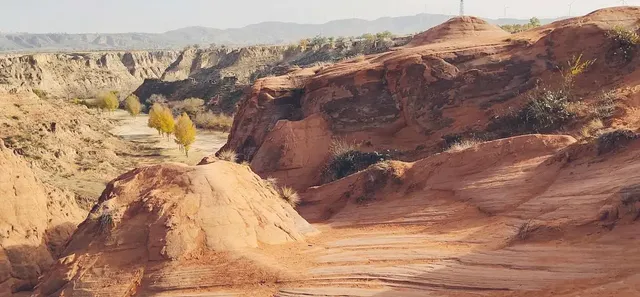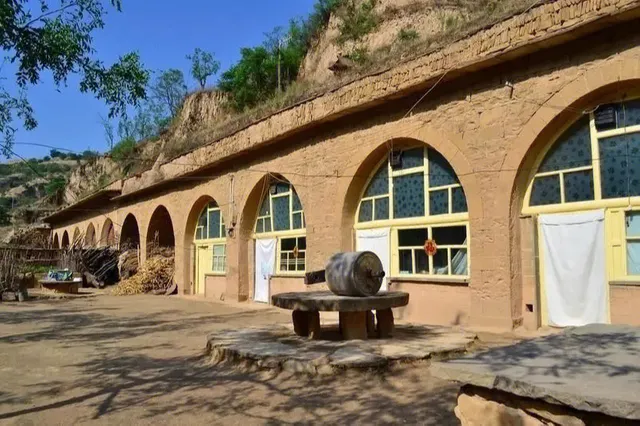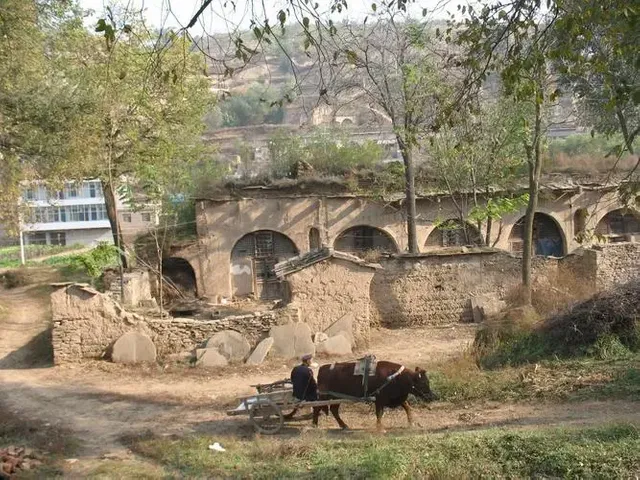
Northern Shaanxi refers to the northern part of Shaanxi Province, which is a revolutionary base and the central part of China's Loess Plateau. Every Chinese person has a deep affection for it. In 1936, after the 25000 mile Long March, the Red Army arrived in northern Shaanxi and established a base there, making Yan'an a revolutionary holy land.
And I have a special feeling for northern Shaanxi - because it is the cradle of revolution, because there are caves, there are rough folk songs which are bold and unconstrained, there are honest and kind people, there are literati growing up on the barren land: Liu Qing (History of Entrepreneurship), Lu Yao (Life, Ordinary World), Chen Zhongshi (White Deer Plain), etc.
A Bao with a white sheep belly towel wrapped around his head, the tearful folk song from the movie " Grief Over the Yellow River", the passion, poverty, and narrowness of the people of northern Shaanxi in the movie "Life", and the vast yellow sand, this is the impression left by northern Shaanxi on me. But I saw one literati after another on this barren land, well-known and unknown, unwilling to accept fate's arrangement and striving to fight against it.
This is my reluctance and emotion towards northern Shaanxi, and in addition, the family of my uncle and aunt, as well as my cousins are living there. There are my relatives there, but for various reasons, I have not been able to meet my cousins and younger in the past 30 years. During this period, only my uncle came back to our hometown several times. How can I not care enough?
Recently, I accidentally read Zhang Lengxi's "Snow Falling in Northern Shaanxi", which was amazing and filled me with a sense of regret for encountering it too late. Why didn't I discover such a good article earlier? I strive to find the story behind the author Zhang Lengxi, so there must be a different story behind the author of a touching article.
Zhang Lengxi, male, Han nationality, born in October 1972, is from Dalate Banner, Ordos City, Inner Mongolia. He is currently a member of the Chinese Poetry Society, the Chinese Chemical Writers Association, the Inner Mongolia Writers Association, the Western Prose Society, the Ordos Academic Research Association, and the former Deputy Secretary General of the Ordos Writers Association. He has published hundreds of works (poems) in "Poetry Magazine", "Chinese Prose", "Prose World", "Poetry Monthly", "Prose Poetry", "Autumn Water", and other publications.
He is also a child who emerged from poverty, no wonder he has such penetratingl insights into life.
“The silent northern Shaanxi, with its undulating mountains blocking people's view, makes it simple and distant.”
"In northern Shaanxi, you can often meet a young man who is always closely reasoned and well argued when talking about Li Zicheng and Liu Zhidan, and asked he will tell you he is a poet or a prose writer. There is historical precipitation in this, or perhaps because of poverty, people regard writing as a way out."
This reminds me of writer Lu Yao, isn't he a typical example? Only reading can change the fate of a poor child.
The author of "Snow Falling in Northern Shaanxi", Zhang Lengxi, is also an example of how knowledge changes fate, so he is the best able to understand the poverty in northern Shaanxi.
“When I left northern Shaanxi, the snow had already stopped, but the sky was still gloomy, as if there were still grievances that had not been fulfilled. I looked at the mountains after the snow and called out--northern Shaanxi. Two lines of unfounded tears unknowingly hung on my cheeks.”
Snow covers the barren mountains of northern Shaanxi, and it nourishes the land. This snow is the auspicious snow that washes the poverty of northern Shaanxi.
I really want to shout out--northern Shaanxi and gently ask, "Are you okay?”

陕北指的是陕西省的北部,那里是革命老区,也是中国黄土高原的中心部分,每一个中国人都对那里有着一分深厚的感情。1936年,红军经过两万五千里长征后来到陕北,并在那里建立了根据地,延安从此成为了革命圣地。
而我对陕北更是有着一种特殊的感情——因为她是革命的摇篮,因为那里的窑洞,那里粗犷的民歌,那里质朴的百姓,那里贫瘠的土地上生长起来的文人:柳青(《创业史》)、路遥(《人生》《平凡的世界》)、陈忠实(《白鹿原》)等。
头上裹着白羊肚毛巾的阿宝,电影《黄河绝恋》中那如泣如诉的陕北民歌,电影《人生》中陕北人民的热情、贫穷与狭隘,还有漫天的黄沙,这就是我印象中的陕北了。可我又看到了这片贫瘠土地上一个又一个文人,有名气的和没有名气的,他们不甘于命运的安排,在努力与命运抗争着。
这便是我对陕北的不舍和情感,再者,那里还有我叔叔婶婶一家人,有我的堂妹和堂弟。那里有我的亲人,可由于种种原因,近三十年未能够与堂妹、堂弟相见,期间只有叔叔回老家来几次。我怎能够不牵挂?
前段时间,无意中读到了张冷习的《雪落陕北》,令人惊叹,大有相见恨晚之感,这样的好文章为何我没有早发现呢?我努力去寻找作者张冷习背后的故事,这样触动人心的文章其作者背后一定有不一样的故事。
张冷习, 1972年10月生,男,汉族,内蒙古鄂尔多斯市达拉特旗人。现为中国诗歌学会会员,中国化工作家协会会员,内蒙古作家协会会员,西部散文学会会员,鄂尔多斯学研究会理事,鄂尔多斯作家协会原副秘书长。曾在《诗刊》、《中华散文》、《散文天地》、《诗歌月刊》《、散文诗》、《秋水》等上发表作品数百篇(首)。
他也是从贫穷中走出来的孩子,难怪对人生有着如此精辟的感悟。
“沉默的陕北,起伏的群山挡住了人们的视线,这使陕北纯朴而遥远。”
“在陕北,经常可以碰上一个年轻人,一谈起李自成、刘志丹就头头是道,一问不是个写诗的就是个写散文的。这里面有历史的沉淀,也可能是由于贫穷,人们把写作当成了一条出路。”
这使我想起了作家路遥,他不就是一个典型的例子吗?也唯有读书才能改变一个穷人家孩子的命运。
《雪落陕北》的作者张冷习,也是一个知识改变命运的例子,所以,他最能懂得陕北的贫穷。
“离开陕北的时候,雪已经停了,天却还阴郁着,好像还有没有落实的怨气。我望着雪后的群山,喊一声陕北,两行没有来由的泪水,不知不觉挂在了腮边。”
雪覆盖着陕北贫瘠的山,雪又滋润着陕北的土地,这雪是洗涤陕北贫穷的瑞雪。
我也真的想大喊一声陕北,轻轻问一声“你还好吗?”
